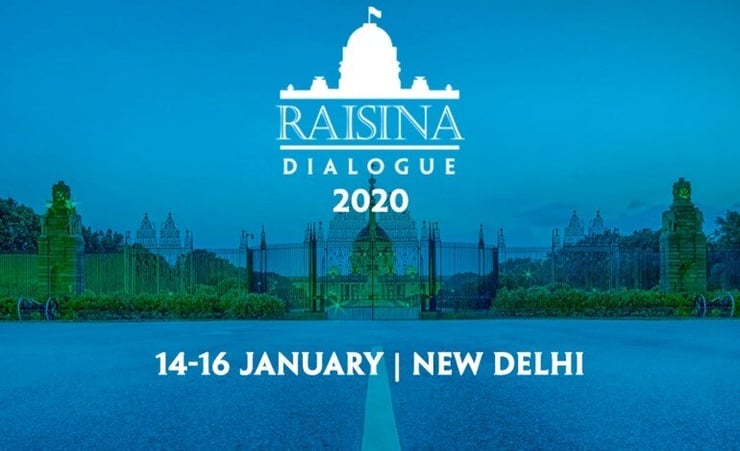Raisina Dialogue 2020: Is the ‘Indian elephant dancing’ well?

In few weeks time when India hosts its flagship multilateral foreign policy conference – Raisina Dialogue 2020 – global experts, including those from New Zealand, will get a chance for a better insight of the Indian elephant’s ‘dancing’ abilities, in its pursuit of the multi-generational goal of being a leading world power.
The Raisina Dialogue is a multilateral conference hosted by a premier India think tank the Observer Research Foundation in collaboration with the Government of India’s, Ministry of External Affairs that seeks to address the most challenging issues facing the global community. Every year, global leaders in policy, business, media and civil society are hosted in New Delhi to discuss cooperation on a wide range of pertinent international policy matters.
Among other things, this conference will give a remarkable opportunity to get an insight of Indian foreign policy and strategic thinking and to assess what David M. Malone – the Canadian author and a former High-Commissioner to India – has famously enquired in 2014 through his book - Does the Elephant Dance? Contemporary Indian Foreign Policy, where he had presented a hitherto unexplored perspective into whether or not India is ready to become one of the five superpowers in the world.
Notably, the Indian political and foreign strategic elites have always been pursuant of the claim of the status of a leading substantial world power, right since its independence from British colonial rule about seven decades ago – a truly exciting, but an equally ambitious – project that continues to attract attention from its friends and detractors, alike.
Ever since David Malone’s apt comparison of the contemporary Indian foreign policy with performing art of dancing, it will not be absolutely imprudent to assess India’s pursuit of the much elusive leading power-status in the international system – as symptomatic of its ability to ‘dance.’
Dance is a form of performing art that consists of purposefully selected sequences and rhythmic human movement of different body parts with aesthetic and symbolic value for the purpose of expressing an idea or emotion.

And by ability of ‘dancing,’ of the Indian elephant, the suggestion is towards carrying out India’s foreign strategic policies in a seamlessly coordinated, rhythmic and aesthetic manner that not only amplifies support for India’s sustained economic growth but also a favourable international order that minimises conflict with existing adversaries and prevents from creation of new adversaries for the Indian state.
What is also inherent in the ‘Indian elephant’s dancing’ here, would be, how the Indian state carries its complex domestic socio-economic policies without increasing too many social anxieties of its own multi-cultural, multi-sectoral, multi-ethnic, multi-religious and multi-linguistic population that can potentially delay, if not impede, India’s rise as a responsible leading power within the international system.
In that regard, for now, it seems that the Indian elephant’s ability to ‘dance’ is under some strain, if not seriously undermined, especially after the recent passing of the Citizenship Amendment Act in the Indian parliament.
Recently the Indian parliament has enacted the Citizenship Amendment Act 2019 after an intense debate in both houses of the parliament with a numerically marginalised opposition. As the amendment of the Citizenship Act, several regions and constituencies of India are already boiling with resentment leading to many demonstrations that have turned violent.
Given the Indian State’s track record of managing internal dissent of its people based on their respective regional, ethnic, linguistic and cultural aspirations, it might be too early to suggest if the Indian State could be distressed to a level where the state had to either choose to back down from its legislative and administrative enactments, or could be discomforted by any level of negative global PR.
The Indian State is not only resolute enough to shrug off such minor irritations but also have on many previous occasions withstood intense global pressures, to continue on a path that it believed was in pursuant to its core national interests.
However, from a foreign policy perspective, two related observations that beg attention are the cancellation of Modi-Shinzo Abe summit meeting in Guwahati amid Citizenship Amendment Act unrest, and the utterances of Indian Home Minister during a parliamentary debate that castigated the political culture of three of its neighbouring states – Afghanistan, Bangladesh and Pakistan.
Japan and India have been strengthening their bilateral relationship in recent years, especially under the leadership of the two Prime Ministers – Shinzo Abe and Narendra Modi. The two leaders had been meeting in annual summit-level talks alternatively in each other’s country.
This year Modi was keen to host Abe in Guwahati and hold the annual summit on the banks of Brahmaputra and take him to Manipur to pay homage to soldiers of the Imperial Japanese Army and Netaji Subhas Chandra Bose’s Indian National Army, who were defeated by the British Army in the Battle of Imphal in 1944.
The cancellation of the summit will not have any discerning impact at all on either the bonhomie of the two Leaders or the overall bilateral relations between the two countries as the two governments are already exploring opportunities of hosting the summit in either January or April in 2020.

On the other hand, the Indian Home Minister’s comments may or may not cause some minor irritations to India’s relations with three neighbours, and is likely to enhance some immediate workloads of their respective foreign policy mandarins, who would have already swung into a damage control mode to prevent any long-term impact on the wider bilateral relations.
In the realm of foreign policy, generally, states and their statesmen, refrain from unnecessarily stepping-on the sense of pride of the fellow nation-states, despite any measure of asymmetric power-difference between them.
In India’s case, it’s not that there could be any immediate significant implications from the events unfolding in New Delhi, except that it compels the world to take notice if the ‘Indian elephant is dancing well’ – and by dancing well it means – where are Indian state’s immediate priorities and how well is the Indian polity pulling all strings of its complex domestic and foreign policy goals.
For long Indian leaders have argued that India has been gifted with a difficult-neighbourhood, which often complicates its foreign-strategic policy choices.
However, from what it appears the manner in which the Indian elephant is dancing at the moment, if it is dancing at all, it appears is stepping on its sub-continental neighbour’s pride.
It’s also another matter that the current government which has been swept to power for a second term earlier this year with a record electoral mandate, is choosing to address the social issues that has potential to exacerbate the complex social- religious fault lines of the complex Indian society, instead of focussing on structural economic reforms to boost an otherwise slowing economy.
Raisina dialogue 2020 will offer better insight into how the Indian elephant has been dancing.




